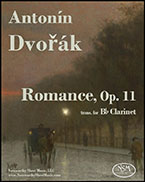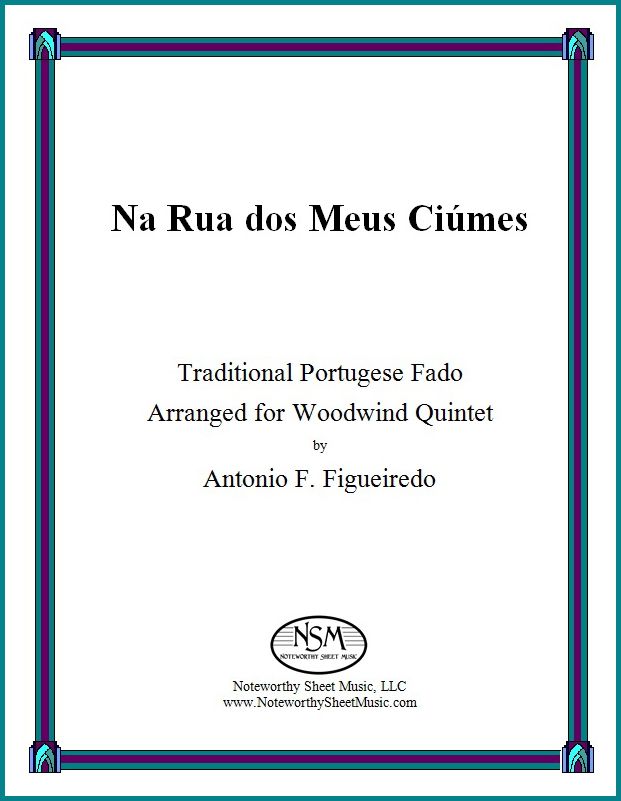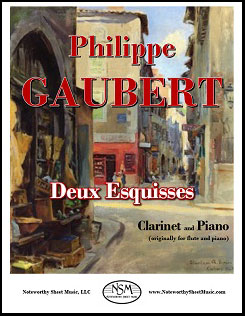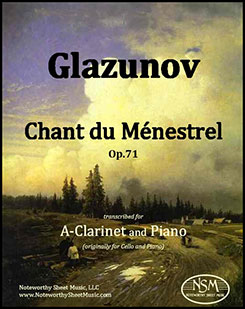Wind Ensembles
Dvořák - Sonatina - Clarinet (and piano)
 Sonatina, Op.100, by Antonín Dvořák
Sonatina, Op.100, by Antonín Dvořák
Transcribed for Clarinet in A (and Piano) by J.W.Pratt and C.A.Vater
A-Clarinet Part, PDF $11.99
From 1892 to 1895, Czech composer Antonin Dvorak (1841-1904) was in the United States, serving as the director of the National Conservatory of Music in New York City. He wrote his Sonatina in G major (Opus 100, B. 183) for violin and piano in 1893, and in some ways it reminds us of his triumphant Symphony No. 9, "From the New World", which was composed the same year. The Sonatina was written for and dedicated to Dvořák's own children. It has an average duration of 20 minutes and consists of four movements: I. Allegro risoluto; II. Larghetto (Indian Lament); III. Scherzo. Molto vivace; and IV. Finale. Allegro.
In transcribing this popular work for clarinet, we have incorporated several changes in the part to account for sonic differences between the clarinet and the violin. In so doing, every effort has been made to maintain the spirit and character of the original composition. In places the New World feel is even stronger with a wind instrument. We provide here our transcribed A-clarinet part only; Dvořák's original piano part works well with the new clarinet part, and the score for violin and piano is readily available in the public domain as a free pdf download from imslp.org.
A-Clarinet Part, 11 pages; Total, 14 pages.
PreviewDvořák – Romance, Op. 11 – trans. Clarinet
 Romance, Op. 11 by Antonín Dvořák
Romance, Op. 11 by Antonín Dvořák
Transcribed for B♭ Clarinet by C. A. Vater (originally for violin)
Part for B♭ Clarinet, PDF $6.97
Czech composer Antonín Dvořák based his Romance, Opus 11 on the slow movement of his String Quartet in F minor, composed in 1873, re-working that Andante con moto quasi allegretto to create two versions of the Romance, one for solo violin and orchestra (B.39) and another for solo violin and piano (B.38). The Romance is one of Dvořák’s most magnificent melodic works, teaming with romance, lyricism, and emotional intensity. Understandably, the piece became extremely popular and has been transcribed for several other instruments, including viola, cello, guitar, and flute. In creating an NSM edition of the work for clarinet (and piano), we have incorporated several changes in the solo part to account for sonic differences between the clarinet and the violin. In so doing, every effort has been made to maintain the spirit, character, and flow of Dvořák’s original composition. We provide here our transcribed B♭ clarinet part only; the score for violin and piano is readily available in the public domain as a free pdf download from imslp.org, and that piano part can be used in performance along with our clarinet part.
B♭ Clarinet part, 4 pages; Total, 6 pages.
PreviewFigueiredo - Na Rua Dos Meus Ciúmes - WW5
 Na Rua dos Meus Ciúmes, Traditional Fado
Na Rua dos Meus Ciúmes, Traditional Fado
Arranged for Woodwind Quintet by Antonio F. Figueiredo
Parts and Score, PDF $10.00
Na Rua Dos Meus Ciúmes is a traditional Portugese fado, still highly popular among recording artists today. This passionate love song tells the story of the intense jealousy experienced by a girl upon seeing her lover pass by with another woman on the street near her home. Though her pain is palpable, the girl is proud and determined to endure her suffering resolutely and without tears.
Antonio Figueiredo was born in the Azores, Portugal, and now resides in Massachusetts. He grew up listening to (and falling in love with) fado music, with all its romance and passion, and its timeless themes of love, loss, jealousy, poverty, and the sea. Figueiredo is a bassoonist who plays regularly in various orchestras and chamber music groups in the Boston area. He enjoys arranging folk tunes for woodwind quintet, and he created this delightful and engaging arrangement of Na Rua Dos Meus Ciúmes for one of his own groups. The piece is scored for flute, oboe, clarinet in B-flat, horn in F, and bassoon.
"This brief piece is a charming addition to the quintet repertory." Read John Ranck's full review of Figueiredo's arrangement of Na Rua Dos Meus Ciúmes.
Score, 5 pages; Parts, 1 page each; Total, 12 pages.
PreviewGaubert - Deux Esquisses - Clarinet and Piano
 Deux Esquisses, by Philippe Gaubert
Deux Esquisses, by Philippe Gaubert
transcribed for Clarinet and Piano by C. A. Vater
Clarinet part and Piano score, PDF $9.99
Philippe Gaubert was a prominent French flutist, composer, and conductor who held a professorship at the Paris Conservatory and principal conducting positions at the Paris Opéra and the Orchestre de la Société des Concerts du Conservatoire. We’ve created a transcription of his Deux Esquisses (Two Sketches) for B♭ clarinet, complete with piano score. These pieces were written for flute and piano but are nicely adaptable for other winds. They were originally published by Heugel & Cie, in 1915 (No.1) and 1914 (No.2), and are now in the public domain. No.1, Soir sur la Plaine (Evening on the Plain), opens intriguingly with the solo instrument playing alone, repeating a single note. This motif sets the lovely, mysteriously forlorn tone of Soir sur la Plaine, and returns multiple times later in the piece. No.2, the second sketch, is Orientale, which, as its name suggests, evokes an atmosphere seemingly strange and foreign, Eastern.
Piano Score, 10 pages; Clarinet part, 4 pages; Total, 20 pages.
PreviewGlazunov - Chant du Ménestrel - trans. for A-Clarinet and Piano
 Glazunov - Chant du Ménestrel, Op.71, by Alexander Glazunov
Glazunov - Chant du Ménestrel, Op.71, by Alexander Glazunov
Transcribed for A-Clarinet and Piano by C.A.Vater
Score and Part; PDF $7.99
Alexander Glazunov (1865-1936) was an eminent composer in the late Russian romantic tradition. In 1901, he published two versions of his Chant du Ménestrel, one for cello and orchestra and another for cello and piano, dedicating the work to Alexandre Wierzbilowicz, principal cello at the Russian Imperial Opera Orchestra and a professor at the Conservatory. Chant du Ménestrel (Minstrel’s Song) is a sorrowful, romantic piece that evokes the image of a Russian troubadour wandering the countryside, singing his sad songs. The lyrical, expressive solo cello line is without double stops and readily transcribed for other instruments. Written in the key of F# minor, this short work (average duration 3-4 minutes) adapts especially well for A-clarinet.
Score, 4 pages; A-Clarinet part, 2 pages; Total, 10 pages.
Preview